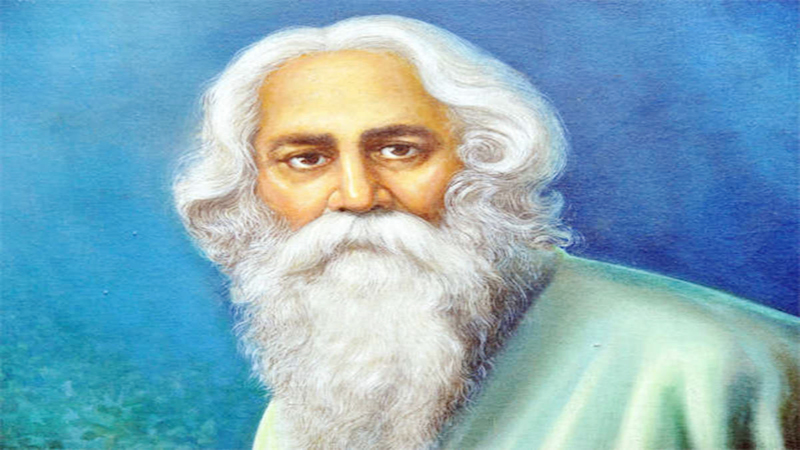
Rabindranath/ the unique, immeasurable genius of Bengali literature

Dr. Amanur Aman, Editor and Publisher, Daily Kushtia & The Kushtia Times /
Today is 25th Baishakh. Bengali year 1428; On this day, Rabindranath Tagore, the unique, immeasurable genius of Bengali literature, was born at Jorasanko's Thakurbari in Kolkata. Today is his 160th birthday anniversary.
Rabindranat’s writings riches all the genres of Bengali literature. His outstanding contribution to the development of Bengali literature and Bengali culture and truly that the Bengali literature got a new look, a thought that carries a rare honour in the world arena.
Only Rabindranath has a chapter of his own in Bengali literature. That chapter has given a great height to Bengali literature. This timeless poet was not only in Bengali literature, Tagore was one of the greatest geniuses of all time in world literature. He is called the poet of Bengal; More than that, he was a world-renowned poet; World poet.
Rabindranath is said to be a versatile genius who had a colourful career of multifaceted talent. He was a poet, musician, novelist, playwright, artist, essayist, philosopher, educationist and social reformer. Basically, his talent as a poet is recognized worldwide.
The literary reality of Rabindranath was the love of united souls. This union is each entity with the whole; the fauna, the cosmos, nature. Not only that, the world of art, the world of imagination to connect with its own expansion.
He was awarded the Nobel Prize in 1913. He was the first among the most intelligent and distinguished people in all of Asia to win this award.
Rabindranath had a lifelong career. His whole life was the basis of his creation. Every room in life finds its literary ideology. The basis of his literary philosophy was the underlying sense of life; Which was based on deep practice and constant scrutiny; The basis of which was the ever-changing literature, culture, civilization, philosophy and science of the world. Rabindranath has placed this change in his mind. But he was steadfast; His creativity was based on his ideals which are notable in his poems, songs, short stories, novels, essays, plays, lyric plays, dance plays, travelogues, letters and lectures given at home and abroad and for the same reason they have never lost relevance. From this point of view, he was not only the genius of his time, a genius of time.
Thus it can be seen that Rabindranath's multi-coloured poetic thought is sometimes expressed in a conservative style, sometimes in a humorous lightness, sometimes in a philosophical seriousness, and sometimes in an exuberance of joy. Many of these verses of Vaishnava poets of the fifteenth and sixteenth centuries are touched, and the Upanishads are also touched. The influence of the mystic Sufi saint Kabir and the devotional poet Ramprasad is also noticed in his poetry. However, researchers say that Rabindranath's poetry reached its peak of creativity and convenience only after he became acquainted with the folk music of rural Bengal. The proximity of prominent Baul composers of Bengal including Lalon Shah, Gagan Harkara, Kangal Harinath created a sense of divinity in his poems. This section helped him to take a stand against religious bigotry.
It is believed that the most influential of Rabindranath's creations was his songs. He composed about 2300 songs. This huge collection of songs, known as Rabindra Sangeet, is an integral part of Bengali culture. Rabindranath's many poems have been transformed into songs, as well as his novels, stories or plays, which are intimately associated with his literature.
The attraction of the emotional power and beauty of Rabindra Sangeet is unquestionable in Bengali society. The Modern Review writes in this regard, “There is no educated house in Bengal where one does not try to sing Rabindranath's songs or at least try to do so… even uneducated villagers sing his songs. The national anthem of Bangladesh and the national anthem of India is composed by Rabindranath. He is the only soul who is the creator of the national anthems of the two countries.
Editor & Publisher: Dr. Amanur Aman, M. Phil (IUK), PhD (NBU-Darjeeling)
Advisor Editor: Ajoy Maitra
Managing Editor: Shanaz Aman, Executive Editor; Mythos Aman
News & Commercial Offices: T&T Road, Thana Traffic More, Kushtia-7000.
Mobile: 01713914570, E-mail: editor@thekushtiatimes.net
All rights reserved © 2022 thekushtiatimes.net